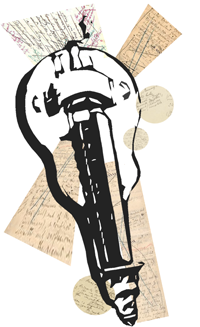After my father died in January I had his mail forwarded to me. There wasn’t much. He was a long-retired mailman and an increasingly hermetic widower of seven years. By August it had become a trickle of fundraising pleas from the Disabled American Vets and his local Catholic church.
Yesterday his mail contained a personal letter. Unprecedented. The few people who’d attended his funeral all said they hadn’t seen him in years or spoken in months. Correspondence was out of the question.
I showed it to my wife. I had immediately recognized the handwriting on the envelope as my brother’s. So did she. The forwarding label said that it had been sent to me on August 11. It had originally been mailed on August 2, my brother’s fifty-eighth birthday. There was no return address.
I slit the envelope. It contained only a Topps football card for Pittsburgh Steeler Heath Miller. Signed by the player.
It made a degree of sense. My father and brother were both Pittsburgh fans to the marrow. And both were former mailmen with time on their hands. Less logical was my brother sending the card to a man eight months dead.
And less logical still, my brother himself had died in 2014.
I didn’t break into the cold sweat of a ghost story. Nor did I scoff like Holmes and pluck reason from a cesspool of superstition. Instead I sat stunned by the evidence that two dead mailmen were sending letters in the next world.
While the explanation I learned today wasn’t supernatural, neither was it entirely rational. After he became disabled, my brother had whiled away his days expanding his imperial sports memorabilia collection. It was a campaign as well planned and executed as any of Caesar’s. He had bought a guidebook with the address of every player in the NFL and NBA. He sent each a packet containing the appropriate sports trading card, a letter requesting an autograph, and a stamped self-addressed envelope.
The address books made it clear that autographed cards were strictly one to a customer. To circumvent this rule, and to build up a trading surplus, my brother had sent out requests in not only his own name but his wife’s, my mother’s, and evidently my father’s. Athletes notoriously got to them when they got to them; Heath Miller had just retired from the team, Google advised, which explained why he now found himself with the time to respond.
I don’t know what it means that I wasn’t on my brother’s mailing list of straw men. I do know that I wish there had been no explanation, at all, that my brother had somehow reached out to my father knowing that he would be there to respond.
I had never said goodbye to my brother. The last time I saw him was on a trip to our hometown for a family visit. I saw him in the hospital, where he spent more time than at home. He was so ravaged by the diabetes he refused to treat that the nurses asked whether he—two years younger—was my father. It was the first time I had seen him without his legs. The prostheses, absurdly shod in black Keds high tops, stood in the corner, and without them he looked like a human caterpillar. His teeth were mostly gone; when they loosened, he told me, he simply yanked them out with his fingers. But when he smiled he still had the eyes of a happy child. So much so that when I got the call that he had died, a few weeks later, I kept repeating, “He was just a little boy.”
To impose meaning on coincidence is to believe that there really are faces in the clouds, that the universe sends us private messages by driving school buses over Mexican cliffs. Yet my brother, sitting in his kitchen years ago, had set in motion a chain of events that would include a professional athlete mailing a letter on a birthday my brother would never see to a father already dead to be intercepted by a brother long absent. Had I received it during a fat, languid time of achievement and safety it would have remained an anecdote for the second beer.
But I hadn’t. Instead it slid through a mail slot into a house whose contents were evaporating into consignment stores and storage units and Goodwills. To inform a future whose only certainty seemed to lay in its bleakness.
Yet it was at that moment, from the other side of an abyss even deeper than my own, that he managed to say hello.





3 Responses to “Put it in a Letter”
Mary Ellen Smith
This is a really moving essay,’Terry. Love it??
Terence hawkins
Thank you Mel!
Jean Manifesto
I understand what it is like to be haunted by the death of a sibling. So many questions that will go unanswered.